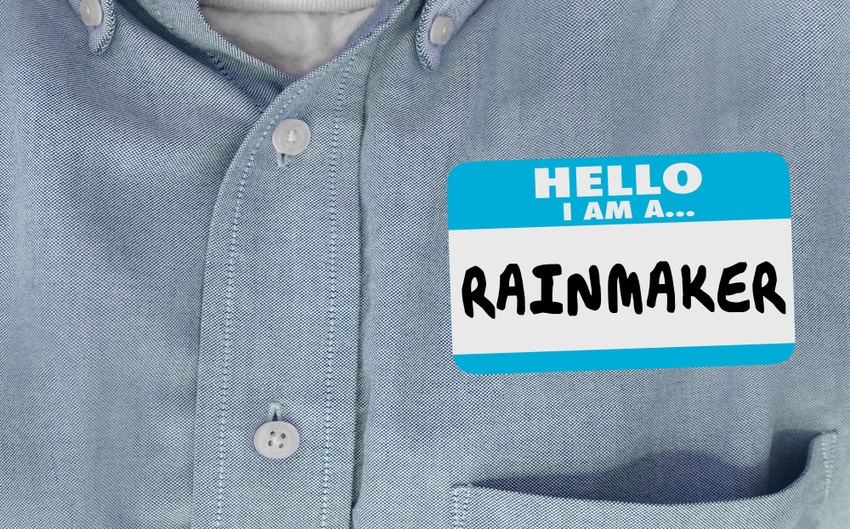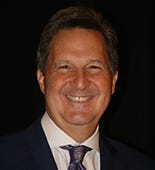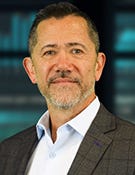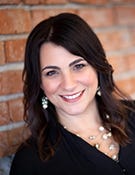Most sales organizations think too small.
August 19, 2019

By Kelly Teal

Trans4mers’ Mike Schmidtmann
There’s a lot of money to be made in the channel — are you getting your share? Michael Schmidtmann, peer group facilitator and business coach for Trans4mers, a sales leadership consultancy, would argue, probably not.
“Most sales organizations think too small and sell at a tiny fraction of what they are capable of,” he said.
Schmidtmann wants to change that and designed the “Meet the Rainmakers” event at Channel Partners Evolution 2019 accordingly. The session, part of the Marketing & Technology Track sponsored by Nextiva, will arm attendees with insight into winning large monthly recurring revenue accounts. Schmidtmann will moderate, engaging the three panelists he hand-picked in a lively discussion that will give partners techniques for winning “whale” accounts.
“Success in this business is simple, but not easy,” Schmidtmann said. “The rainmakers on this panel aren’t magical and they aren’t superhuman. They are diligent, focused and really good at what they do.”
Schmidtmann should know — he’s one of them. After leading channel sales for 20 years, he started his own business in 2008 teaching salespeople how to succeed. There’s a lot for clients to learn.
“I hate to say it, but most salespeople in this industry don’t know what the hell they are doing,” Schmidtmann said.

CWPS’s Frank Lusko

Hyde Group’s Michelle Hyde

Eclipse Telecom’s Dave Dyson
That’s why he chose Dave Dyson, CEO and chief strategist of Eclipse Telecom; Michelle Hyde, principal consultant and founder of the Hyde Group; and Frank Lusko, executive vice president of sales and marketing for IT managed services provider CWPS Inc., to join the panel. In the lead-up to Channel Partners Evolution 2019, Channel Partners interviewed each participant and compiled their answers into this Q&A edited for length and clarity. Responses are presented in last-name alphabetical order.
Channel Partners: When did you get your start in sales/business development (whether in the channel or not)? What was the job?
Dave Dyson: My first technology sales job was right out of college working as a product representative for Corel software. I traveled all over western and upstate New York visiting MSPs and IT consulting firms to sell them on the value of selling our software. I logged about 1,000 miles a week in the car, stayed in really crappy hotels and was kicked out of plenty of respectable office buildings for breaking the “no cold-calling” rules.
Michelle Hyde: I have been in voice, data and cloud communications for more than 25 years. I started as a client retention specialist during the merger and acquisition of a telecom company as a temporary hire at age 19 and never left the industry. I have held various roles at various communication companies but started in sales in my mid-20s and never looked back, except for a few sales and marketing management roles. I’ve always returned to an individual contributor sales role.
Frank Lusko: I started selling because I was forced into it as a new business owner. If I wanted…
…to feed my family and move out of our shoebox apartment, I had to make the transition from tech to salesman.
CP: How did you know selling/business development would be the right career fit for you?
DD: It was a logical fit for me at the time in the late ’90s. I had a lot of interest in technology and it was the start of the dotcom era. I have a natural desire to internalize and want to solve problems and I feel like the best sales pros know how to hear a problem and understand if they have a solution for it. Prior to founding Eclipse, I had only ever had sales roles. It has always felt like a place where I can have a positive impact and make things better for others.
MH: My first two years in sales roles set the tone for me in achieving President’s Club, the money, the trips, the recognition. Who would ever want to move from sales? In a managerial role, I achieved sales manager of the month many times and left the role on a great note to go back into enterprise sales. The notion of finding solutions, like solving a puzzle, for clients has always been a high for me.
FL: I’ve been a leader and a pretty good follower all my life, but owning a business was the catalyst. The level of responsibility is intense. You must sell and you must develop people, but the satisfaction of closing the big deal or knowing you were instrumental in someone’s development hooks you.
CP: How did you land in the indirect channel?
DD: I left AT&T in 2007 to work for an indirect telco seller. That was where I learned about the ins and outs of how the channel works, and also where I began to sense the broader opportunities. At that time most of the channel was focused on SMB and I had come from large national and global accounts at AT&T. It seemed to me that larger enterprises could really benefit from the care and passion that the channel was known for delivering to the SMB. As the economy collapsed in 2008-09, starting Eclipse seemed very logical. I believed that large telcos would dramatically cut service and negatively impact customers and there would be a vacuum there.
MH: I showed up for a territory manager role interview with a national data center company and arrived a bit early. There was another person meeting with my interviewers. This guy introduced himself to me, and I researched him, assuming he was my competition. Then I called him, asked him if he too was interviewing for this same job and attempted to get to know him. Bold move on my part, but I wanted to size up my competition. He quickly turned the tables on me saying that he was a solo, one-man shop agent and asked if I wanted…
…a job. … I took the leap. I worked to not only build my book of business but was a key member to assist in the operational infrastructure build we had to do as a small and rapidly growing firm. I was there for four years, and then cut out on my own.
FL: After selling my small business, I was recruited to join a Fortune 500 tech company where I spent a few years learning that side of the business. Again, priceless experience, and one where I really learned the channel and a partner’s perspectives around running a business. There were so many different types of partners, and they all ran their businesses in their own ways. I developed great relationships with partners throughout the country and 14 years later I’m still happily working for one of them.
CP: What do you love about being in the channel?
DD: The people. There are so many smart and motivated people in the channel and it is filled with innovation and entrepreneurship. It’s so great to be surrounded by so many people who have such passion for their customers. We have a whole industry full of people who actually give a s*** about the customer, at a time when the big providers may not always be filling that need. That’s very invigorating to be around.
MH: The simple response here is; control, freedom and money. This is what the channel offers those who truly seize it, work it and embrace it.
FL: I enjoy working with customers. I enjoy introducing them to new, innovative services that have a positive impact on how they operate their business.
CP: How much was your first really big sale — whether in the channel or not — and what was the key to winning it?
DD: The first deal I did over $1 million in contract value was in 2001 while working for AT&T (SBC at the time). I sold new phone systems to a large grocery retailer. We won the headquarters and call center as well as all the stores. The key to winning then was similar to the key now. It was a team effort with multiple people chipping in with the strengths they had. The most critical factor was really digging in with the customer. … When it came time for final proposals, rather than focus on the price and the technology, we focused on the productivity outcomes, standardization and the road map for how we would make the rollout go well. This is something I have lived by since. If you can show clients that they are buying outcomes not technology, you will win way more often than not.
CP: How much was the biggest deal you’ve lost and what did you learn from that experience?
DD: We learn something from every deal we lose. Sometimes it’s an issue of alignment, other times it’s that we missed something critical in our discovery process. Thinking back…
…on a recent large loss, the major issue was not getting a full understanding of the client’s full decision-making and buying process. [When we got to the end, we found] out the most important stakeholder was not at the table. In that case, the higher-ranking member of the team overruled the folks who were in favor of us and awarded the decision elsewhere. It was a strong reminder to make sure we understand all of the players going in.
CP: For every deal someone wins, there have to be more they don’t get. What inspiration can you share with partners who might be having trouble scoring big-dollar sales and may be struggling the frustration that comes with that?
DD: Keep at it and ask for help. There are people out there who understand what it takes to win these deals. Seek them out, and ask for shared experience and guidance. We are in a rising tide moment in this channel. …Ten years ago, a $50,000 MRC deal in the channel was earth-shattering. Now they happen every day and $1 million MRC deals are happening. Don’t be afraid to think big.
MH: Don’t be afraid of team selling. To that end, don’t be foolish in team selling either. Make sure everyone knows their role, and what the commission splits are going to look like and above all, vet your partners well to assure you are like-minded in approach.
Second, be educated and fearless enough to tackle projects up-market from where you are today. … No one knows everything. Clients understand this and are looking to you for greater understanding … Having the guts to go for it and knowing that you have a team that wants your success (and theirs) behind you, is how you can get there. Try it. If you bomb, take note and try it again!
FL: Grow a thick skin. News flash: You lose more than you win. Be accountable for the loss and learn from it. If you’ve got a good product/service and good people, then it’s the process that needs attention. You must have a good, detailed process from marketing to qualifying to close to win big deals and you must do everything in your power to follow it.
CP: What’s the overarching message you want to share with Channel Partners Evolution attendees?
DD: Be willing to change and adapt. The technology landscape is changing faster than ever; we need to evolve, too. The opportunity is larger than ever for those who embrace new technologies, new ideas and new partners. The clients are ready to work with us, we need to step up our game to meet them. If you are struggling with where to start, pick one thing and work to get exceedingly good at it. There is huge market value right now in having the expertise to help clients transition from traditional modes of doing business to the cloud-based models of today.
MH: Know what you want, seek out teams to sell with and suppliers that are like-minded in philosophy and approach, and also seek out those who want to see you succeed. There are more naysayers out there than supporters. Find the supporters. They will amplify you and get you to a confidence level where you feel you can take on the world. Keep learning, keep applying yourself, keep evolving, keep a great attitude and be a great facilitator of technical discussions with your clients and teams.
FL: A good, pragmatic, measurable sales process is not only essential for closing deals, but imperative for developing sales talent. You have to start with the right sales framework for your business.
Read more about:
AgentsYou May Also Like
